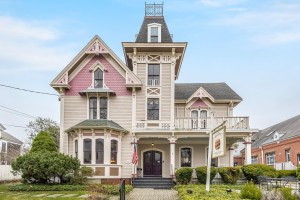Not in Newton’s Back Yard: Affordable Housing in Newton

This decommissioned firehouse in Waban became the battleground between affordable-housing advocates and fearful residents. (Photograph by Justin M. Hamel)
On the western end of Beacon Street, a block from Newton-Wellesley Hospital, sits a charming 1917 brick firehouse with a lookout tower, known in these parts as Engine 6. Decommissioned as a fire station decades ago, the building marks the entrance to Waban, one of the most affluent of Newton’s 13 villages. A leafy enclave where average home prices top $2 million and incomes and education levels rank among the nation’s highest, it has long been the neighborhood of choice for Red Sox players from Ted Williams to Jason Varitek—an upscale slice of suburban paradise just 7.5 miles due west of Fenway Park.
Newton is a reliable redoubt of philanthropy and progressive politics—in 2012, an overwhelming 71 percent of the city voted for Barack Obama. The city’s ambitious Democratic mayor, Setti Warren, is often mentioned as a candidate for higher office, and was the favorite for the Democratic Senate nomination in 2012 before being shoved aside by Elizabeth Warren, who nonetheless carried Newton by nearly two votes to one. But despite its progressive bona fides, the city has long struggled to live up to its liberal ideals in one major area: affordable housing.
The city is already 90 percent built out, and it is chronically short of the state-mandated threshold of having 10 percent of its units be affordable housing. When an affordable unit comes on the market—a one-bedroom condo for $155,000, or a two-bedroom rental for $1,269 per month—Newton treats it like a lottery ticket. So in the summer of 2013, when the idea of converting Engine 6 came along, Setti Warren and other city officials felt they had a slam-dunk idea for expanding their affordable-housing stock. The city would partner with Pine Street Inn, the highly respected provider of services to the homeless throughout the region, best known for its shelters in Boston. Together, they’d convert Engine 6 into permanent housing for nine chronically homeless people and one supervisor. The proposal called for a nonprofit developer to use $1.4 million in city-controlled federal low-income housing funds toward the $3 million redevelopment project, picking up the rest from state funds and other sources. It seemed like a rare—nearly singular—chance to use an existing building to help the very poor. Everyone involved with the proposal seemed eager to help the disadvantaged.
And so it came to pass that in mid-June of 2013, about 60 residents gathered at the Waban community library on a cool Monday night to air their thoughts with officials from Pine Street Inn and their partner, Metro West Collaborative Development.
Representatives from Pine Street and Metro West were just a few slides into their presentation when residents began asking loud, angry questions. Just who exactly would be selected to live at Engine 6? And where would they get needed services? And who thought Waban would make a good home for “those people,” anyway?
The presenters seemed ill prepared. The tenant resources they listed were located in Boston and Brookline, and appeared to be boilerplate from other projects. A half-hour in, Newton Alderman Brian Yates recalls thinking that the meeting was already a total disaster. Then someone asked if the target population would include sex offenders. And things got worse.
In response to the question, one of the presenters gave a frustrating, bureaucratic answer: Sex-offender information was blocked by law, and inaccessible. “That drove people crazy,” says Yates, who adds that a more helpful response would have been something like, “We’re going to screen these people within an inch of their lives and we’ll make damn sure that no one who’s not squeaky clean will get in.”
The presenters appeared to be in shock. Up to that moment, the plan had received nothing but unequivocal support, at least within City Hall, according to Alderman Deb Crossley, who moderated the meeting. Furious, a representative from Metro West told the crowd that the city was going ahead with the plan anyway. A resident exploded, pleading, “Why are you doing this to us?” Crossley, an architect by trade, says, “Many were agitated and angry, believing we would deliberately introduce a criminal element into their pristine community.”
Kathleen Hobson, a Stanford graduate and mother of three—her husband is the acclaimed surgeon and author Atul Gawande—was one of the only neighbors who spoke in favor of the idea. Having volunteered at Pine Street Inn for years, she didn’t share their fears. “The accusations bore no relation to the people I knew—you know, the crazies, the pederasts, the drug addicts wandering our leafy streets scaring our children,” she says. “That just didn’t jibe with the reality I knew.”
By the end of the meeting, Jennifer Van Campen, Metro West’s executive director, felt uneasy at the thought of walking to her car by herself. “People were really attacking me,” she says, “pointing their finger, turning red, and spitting. ‘Why are you trying to ruin my neighborhood?’ We were underprepared for people’s vehemence.”
That night, Van Campen wasn’t the only one concerned about her personal safety. “One gentleman said something to the effect that, ‘You don’t care if the people around here live or die. You’re putting our lives in jeopardy,’” Yates recalls. “I just wanted to get out of there without a riot breaking out.”
The Boston Home team has curated a list of the best home design and home remodeling professionals in Boston, including architects, builders, kitchen and bath experts, lighting designers, and more. Get the help you need with FindIt/Boston's guide to home renovation pros.


